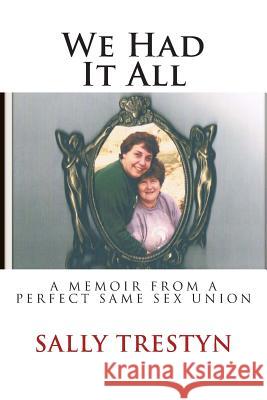We Had It All: A Memoir Of A Perfect Same Sex Union » książka
We Had It All: A Memoir Of A Perfect Same Sex Union
ISBN-13: 9781494201166 / Angielski / Miękka / 2013 / 208 str.
WE HAD IT ALL When Phyllis moves next door in Brooklyn, 1970, their children become friends, and the two women become lovers. In this decade of fantastic rebellion, these two Jewish women pursue a more intimate revolt. Given the choice between middle-class respectability and love, they ultimately choose each other. Now, four decades later, Sally captures their unique relationship in her memoir. This true story captures the thrill of New York immediately after Stonewall. Sally bears witness not only to the difficulty of same-sex relationships at the end of the twentieth-century, but also the ease of falling in love. The memoir is told in a series of humorous flashbacks and is populated with all types of zany characters, not least of which are Phyllis and Sally themselves. Sally is a self-confident Brooklyn woman. Her courage shrinks, however, during her first sexual experience with Phyllis in a Hotel. In the heat of the moment, she becomes paranoid and convinced the house detective is listening with his ear pressed against the door. When Phyllis is mistaken for Sally's son, she glows with pride. Sally relates the story of the women, faithfully narrating through their divorces, civil partnership, retirement and old age. What ultimately emerges in this memoir of two women in love is a story about companionship, family, and freedom. Sally relates to the reader that even with all the humor of the book, the times were not always easy or good. She reminds us that being gay meant-even in the late-twentieth century-that you could lose your children. The reader is led to believe that even despite these hardships, Sally and Phyllis never questioned their relationship or regretted their decisions. Their perseverance is a story outside of such labels as "gay" or "straight." I believe that the current moment presents a unique opportunity to publish a story such as my own. With the current media emphasis on such topics as gay rights, gay marriage, and the American family, I believe my story would appeal to a wide audience. Furthermore, I believe that my ability to draw on long-term, up-close experience makes this an exceptional narrative.
Zawartość książki może nie spełniać oczekiwań – reklamacje nie obejmują treści, która mogła nie być redakcyjnie ani merytorycznie opracowana.











